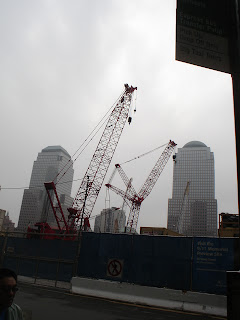Now I know what the composer Charles Ives meant when he said he loved the clashing sounds of passing Memorial Day bands. At this year's Memorial Day service at the Civil War Soldiers and Sailors Monument, the New York Pipe Band had just passed us playing 'It's a Grand Old Flag', when the New Orleans Marine Band struck up with the same tune about a third of the pace faster. It was a fantastic effect with the drawling bagpipes disappearing below the acoustic threshold as the marines pumped out their crisper, edgier version back up on the rotunda.
Mayor Bloomberg was at this service apparently, but we only got there in time for the acknowledgement of a guy who was present, the last surviving veteran of Iwo Jima. I also enjoyed the performance of Taps by an African-American musician in a large red T-shirt. Was he a jazz trumpeter? He played it slow and sad and straight.
Earlier in the morning we had wandered up to Grant's Tomb. An impromptu a capella group just ahead of us in the colonnade gave a spontaneous rendition of 'The Star-Spangled Banner'. Who were these people? Four white people and an African-American wearing a Glass-Steagall T-shirt.
I was struck by by the grandeur of Grant's resting place. He and his wife, Julia, lie inside, inside two giant sarcophagi. Grant himself had been so humble. He received Lee's surrender in a private's uniform. What would he have made of this form of commemoration? It's probably a pure reflection of the public acclaim. He didn't ask for it, but it's what's given.
As we stood inside the colonnade listening to the choir, a middle-aged man came to the foot of the steps outside. He didn't move forward. He seemingly hadn't been intending to come into the monument; but came over from the street and stopped where he was, took off his suncap and held it over his heart - through all three verses.
Mayor Bloomberg was at this service apparently, but we only got there in time for the acknowledgement of a guy who was present, the last surviving veteran of Iwo Jima. I also enjoyed the performance of Taps by an African-American musician in a large red T-shirt. Was he a jazz trumpeter? He played it slow and sad and straight.
Earlier in the morning we had wandered up to Grant's Tomb. An impromptu a capella group just ahead of us in the colonnade gave a spontaneous rendition of 'The Star-Spangled Banner'. Who were these people? Four white people and an African-American wearing a Glass-Steagall T-shirt.
I was struck by by the grandeur of Grant's resting place. He and his wife, Julia, lie inside, inside two giant sarcophagi. Grant himself had been so humble. He received Lee's surrender in a private's uniform. What would he have made of this form of commemoration? It's probably a pure reflection of the public acclaim. He didn't ask for it, but it's what's given.
As we stood inside the colonnade listening to the choir, a middle-aged man came to the foot of the steps outside. He didn't move forward. He seemingly hadn't been intending to come into the monument; but came over from the street and stopped where he was, took off his suncap and held it over his heart - through all three verses.













